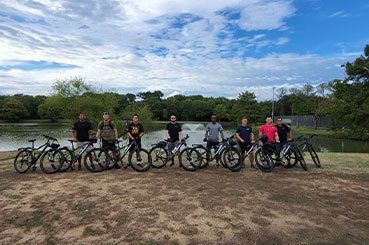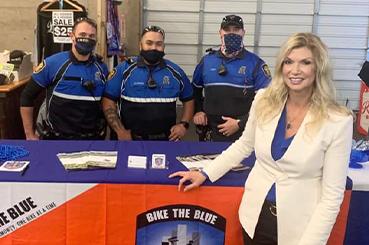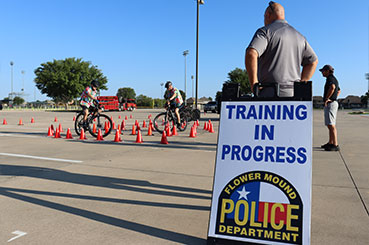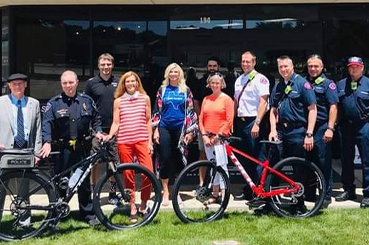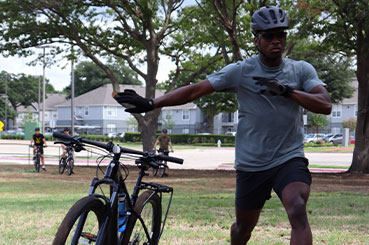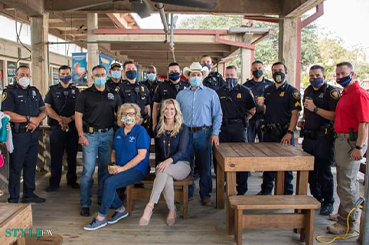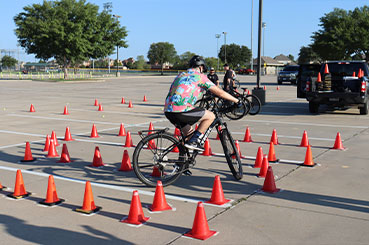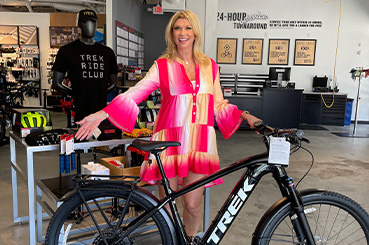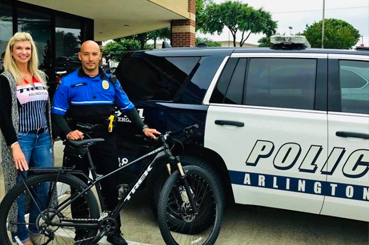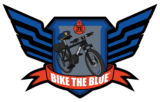Get Involved
Ways to give
Officers still wear body armor and carry most of the same equipment they do in a patrol car in a saddle bag attached to the bike. They must learn specific bicycle skills, such as, Mounting and dismounting, Emergency stops, Slow maneuvering, Curb hopping, Traffic safety, Nutrition, Basic bike maintenance and Bike positioning.
Sponsor a bike
Typically, officers work in pairs and cover anywhere from 30 to 40 miles per day.
Officers still wear body armor and carry most of the same equipment they do in a patrol car, they use a saddle bag attached to the bike.
$3,000 bike, foot clips, water bottle, saddlebag, lights, helmet.
Request a bike unit
Do you want more presence?
Because neighborhoods are unique, and you can’t patrol or police in the same fashion that you would in some areas; bike patrol is a consideration. Bike The Blue will help your department with donated bikes with monies raised from your community and our partners. Patrolling on a bicycle is physically demanding. We pre-screen candidates to ensure they can handle the stress of training and on-bike operations. Officers who are mentally prepared for bike training often find that the techniques and skills are easily mastered within a few days. Many agencies require candidates to participate in an oral interview process and/or a demonstration of physical abilities. A basic skills assessment would be ideal for most officers considering this type of training.
For departments considering setting up a bike patrol unit, here are some key considerations:
- Provide enough officers to remain effective
- Acquire high-visibility, comfortable uniforms
- Select hand-picked, enthusiastic leadership
- Choose community-oriented, proactive officers
- Fulfill all equipment requirments (lighting, helmets, and other safety equipment)
- Benchmark and develop a policy and unit description
- Determine whether or not officers are required to patril in teams
- Personnel scheduling is key if the unit is not full-time
Ways to give
Officers still wear body armor and carry most of the same equipment they do in a patrol car in a saddle bag attached to the bike. They must learn specific bicycle skills, such as, Mounting and dismounting, Emergency stops, Slow maneuvering, Curb hopping, Traffic safety, Nutrition, Basic bike maintenance and Bike positioning.
Sponsor a bike
Typically, officers work in pairs and cover anywhere from 30 to 40 miles per day.
Officers still wear body armor and carry most of the same equipment they do in a patrol car, they use a saddle bag attached to the bike.
$3000 bike, foot clips, water bottle, saddlebag, lights, helmet.
Request a bike unit
Do you want more presence?
Because particular neighborhoods are unique, and you can’t patrol or police in the same fashion that you would in some areas; bike patrol is a consideration. Bike The Blue will help your department with donated bikes with monies raised from your community and our partners. Patrolling on a bicycle is physically demanding. We pre-screen candidates to ensure they are able to handle the stress of training and on-bike operations. Officers who are mentally prepared for bike training often find that the techniques and skills are easily mastered within a few days. Many agencies require candidates to participate in an oral interview process and/or a demonstration of physical abilities. A basic skills assessment would be ideal for most officers considering this type of training.
For departments considering setting up a bike patrol unit, here are some key considerations:
- Provide enough officers to remain effective
- Acquire high-visibility, comfortable uniforms
- Select hand-picked, enthusiastic leadership
- Choose community-oriented, proactive officers
- Fulfill all equipment requirements (lighting, helmets and other safety equipment)
- Benchmark and develop a policy and unit description
- Determine whether or not officers are required to patrol in teams
- Personnel scheduling is key if the unit is not full-time

Bike units have proven to be highly effective in preventing crime and making arrests. They’re a key to community policing and building trust.

Support Bike The Blue
Help us get more bikes in communities. We support Public Safety
Bike Patrol Units(Police, Fire, and EMS).
